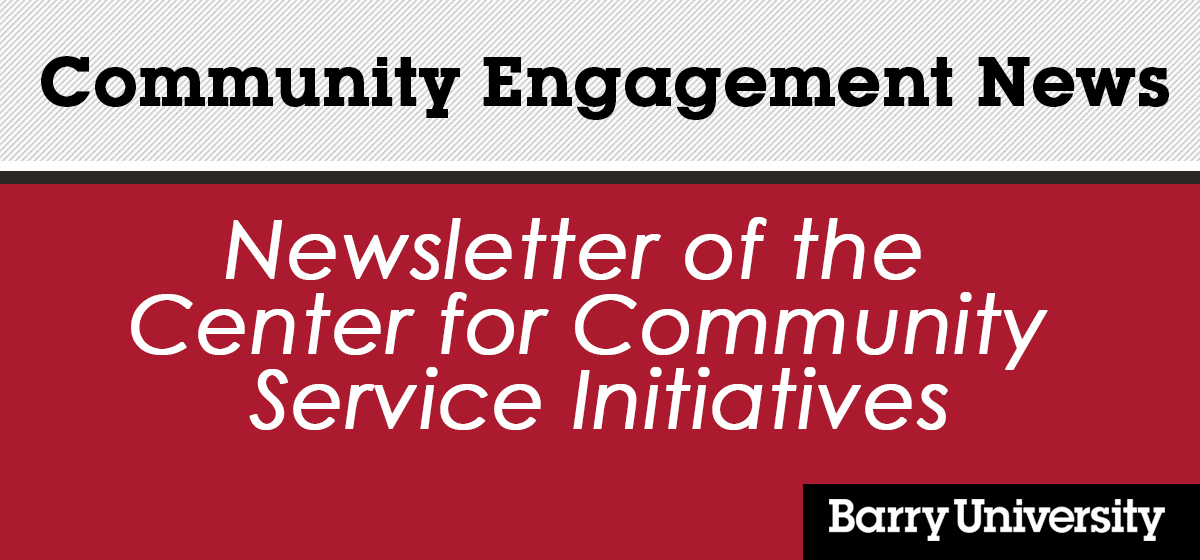Deliberative Dialogue Draws Attention to Climate Change Imperative Community Engagement Symposium Poster Session: A Pictorial Report Volunteers Participate in Environmental Projects in Miami-Dade County Faculty Members to Lead Workshop at National Meeting on Democratic Engagement Frequently Asked Questions Answered at Quality Enhancement Plan Website
| |||||||||||||||||||||||||||||
Deliberative Dialogue Draws Attention to Climate Change Imperative
Combination of Top-down, Bottom-up Approaches Recommended
Cut greenhouse gas emissions; provide economic incentives for good environmental practices; reduce consumption by reusing products. Those and other suggestions emerged from a recent campus forum on climate change and global warming.
Forum participants recommended a combination of top-down and bottom-up approaches to addressing the twin issue. They pointed to the need for the United States to cut greenhouse gas emissions and for ordinary citizens to do their part by lowering their carbon footprint.
The forum was part of the Deliberative Dialogue Series. Titled “Natural Disasters and Climate Change: Is Global Warming Causing More Hurricanes?” the forum drew attention to the gradual increase in the average temperature of Earth's atmosphere and oceans, and to the sustained warming of the planet since the early 20th century.
Forum participants saw the need for adherence to the Paris Agreement, the global accord that charts a new course in addressing climate change. They said people should hold policymakers accountable for their response to global warming and the climate change imperative.
The federal government should provide economic incentives for good environmental practices by corporations and communities, forum participants argued.
According to forum participants, progress in dealing with global warning also requires changes in consumer behavior. If people reduced their demand for certain products and reused what they have, participants said, there would be a curb on production.
A panel of lead participants shared their experiences and perspectives on the issue of climate change and global warming. The panelists were Dr. William “Bill” Russell, an assistant dean in the College of Arts and Sciences; Nadia B. Ahmad, an assistant professor of law; Denis Emilio Ordoñez, Jr., a graduate student and member of the Barry Green Team; and Nancy Metayer, the climate justice program manager at the New Florida Majority.
Russell, who spent eight years at NASA and Columbia University working with the lead scientists on the Intergovernmental Panel on Climate Change, shared research-based information on the effects of climate change.
Ahmad noted that environmental issues affect basic human rights. She called for a “paradigm shift,” with an emphasis on disaster risk reduction.
Ordoñez spoke about the difficulties that people with physical impairments experience during hurricanes. Evacuation is particularly difficult, he said.
Metayer commented on the need for people to have “a voice” and “a seat at the table” so they will feel empowered to play a role in dealing with natural disasters and its consequences. She also suggested “social advocacy” as a way to get the attention of decision makers.
Margaret R. Stewart, director of the Center for Earth Jurisprudence at Barry’s School of Law, moderated the forum. She spoke about the interconnectedness of people and the environment, and about how environmental challenges generally affect people’s livelihoods.
Sister Mary Frances Fleischaker, an adjunct professor of theology, said that the community at large should consider religious and spiritual values in fulfilling its duty and responsibility to protect Earth, “our common home.” She also referred to the evidence of sea-level rise in Miami’s South Beach.
The Center for Community Service Initiatives (CCSI) has adapted deliberative dialogue as a method of civic learning and engagement. The CCSI organizes the Deliberative Dialogue Series to bring together campus and community stakeholders to exchange ideas and weigh perspectives on social, environmental, and economic issues affecting the community.
| |||||||||||||||||||||||||||||
Community Engagement Symposium Poster Session: A Pictorial Report
| |||||||||||||||||||||||||||||
Volunteers Participate in Environmental Projects in Miami-Dade County
Nearly 50 Barry students participated in community-based environmental projects in Miami-Dade County recently. They served as part of two separate groups – one assigned to East Greynolds Park in North Miami Beach and the other to Historic Virginia Key Beach Park in Key Biscayne.
| |||||||||||||||||||||||||||||
Faculty Members to Lead Workshop at National Meeting on Democratic Engagement
Two Barry faculty members will lead a workshop at the 2019 Civic Learning and Democratic Engagement Meeting (CLDE19) Meeting in June.
“Of the People, By the People, For the People: Students = The People” is the title of the 60-minute workshop. The workshop leaders will be Dr. Jalane Meloun, professor of administration in the School of Professional and Career Education, and Dr. Sean Foreman, professor of political science.
They will share information on Barry’s Campus Democracy Project, including the BucsVote initiative, which engaged students in the electoral process during the recent midterm elections.
CLDE19, which will be held June 5–8 in Fort Lauderdale, is a conference intended to facilitate exchanges of knowledge and develop a sense of community around the shared civic learning and democratic engagement of colleges and universities. The conference is designed around the CLDE Theory of Change, which suggests that institutions consider how best to construct campus cultures and contexts that foster civic ethos, civic literacy and skill building, civic inquiry, civic action, and civic agency.
| |||||||||||||||||||||||||||||
Frequently Asked Questions Answered at Quality Enhancement Plan Website
What is the relationship between “PSR” courses and designated service-learning courses? This is one of the questions answered at Barry’s QEP (Quality Enhancement Plan) website.
In all, 17 questions about the QEP are answered in the FAQ section of the website. “PSR” (personal and social responsibility) is the focus of the QEP.
The Center for Community Service Initiatives (CCSI) coordinates the service-learning designation process.
| |||||||||||||||||||||||||||||
Community Engagement News
Posted On : April 29, 2019

